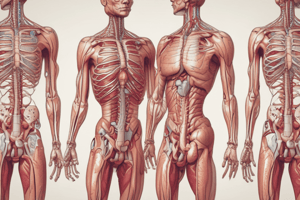Podcast
Questions and Answers
What is the primary function of the cardiovascular system?
What is the primary function of the cardiovascular system?
- To support the immune system
- To transport oxygen and nutrients to the body's tissues (correct)
- To regulate body temperature
- To produce hormones
Which of the following is NOT a component of the cardiovascular system?
Which of the following is NOT a component of the cardiovascular system?
- Heart
- Blood vessels
- Lungs
- Muscles (correct)
What is the term for the circulation of blood between the heart and lungs?
What is the term for the circulation of blood between the heart and lungs?
- Peripheral circulation
- Cardiac circulation
- Systemic circulation
- Pulmonary circulation (correct)
What is a major risk factor for developing cardiovascular disease?
What is a major risk factor for developing cardiovascular disease?
What is the function of veins in the cardiovascular system?
What is the function of veins in the cardiovascular system?
What is the term for conditions that affect the heart and blood vessels?
What is the term for conditions that affect the heart and blood vessels?
What can help prevent cardiovascular disease?
What can help prevent cardiovascular disease?
What is the liquid tissue that transports oxygen, nutrients, and waste products throughout the body?
What is the liquid tissue that transports oxygen, nutrients, and waste products throughout the body?
Study Notes
Cardiovascular System
Definition: The cardiovascular system, also known as the circulatory system, is a network of organs and vessels that transport blood throughout the body.
Functions:
- Transports oxygen and nutrients from the lungs and digestive system to the body's tissues
- Removes waste products, such as carbon dioxide, from the body's tissues
- Regulates body temperature
- Maintains blood pressure
- Supports cellular metabolism
Components:
- Heart: a muscular organ that pumps blood throughout the body
- Arteries: blood vessels that carry oxygenated blood away from the heart to the body's tissues
- Veins: blood vessels that carry deoxygenated blood back to the heart
- Blood: a liquid tissue that transports oxygen, nutrients, and waste products throughout the body
- Blood vessels: tubes that transport blood throughout the body, including arteries, veins, and capillaries
Blood Circulation:
- Pulmonary circulation: the circulation of blood between the heart and lungs, where oxygen is absorbed and carbon dioxide is removed
- Systemic circulation: the circulation of blood between the heart and the rest of the body, where oxygen and nutrients are delivered and waste products are removed
Cardiovascular Health:
- Risk factors: factors that increase the likelihood of developing cardiovascular disease, such as high blood pressure, high cholesterol, smoking, and physical inactivity
- Cardiovascular disease: conditions that affect the heart and blood vessels, such as heart attacks, strokes, and peripheral artery disease
- Prevention: maintaining a healthy diet, exercising regularly, and managing stress can help prevent cardiovascular disease
Cardiovascular System
- The cardiovascular system, also known as the circulatory system, is a network of organs and vessels that transport blood throughout the body.
Functions
- Transports oxygen and nutrients from the lungs and digestive system to the body's tissues
- Removes waste products, such as carbon dioxide, from the body's tissues
- Regulates body temperature
- Maintains blood pressure
- Supports cellular metabolism
Components
- Heart: a muscular organ that pumps blood throughout the body
- Arteries: blood vessels that carry oxygenated blood away from the heart to the body's tissues
- Veins: blood vessels that carry deoxygenated blood back to the heart
- Blood: a liquid tissue that transports oxygen, nutrients, and waste products throughout the body
- Blood vessels: tubes that transport blood throughout the body, including arteries, veins, and capillaries
Blood Circulation
- Pulmonary circulation: the circulation of blood between the heart and lungs, where oxygen is absorbed and carbon dioxide is removed
- Systemic circulation: the circulation of blood between the heart and the rest of the body, where oxygen and nutrients are delivered and waste products are removed
Cardiovascular Health
- Risk factors: high blood pressure, high cholesterol, smoking, and physical inactivity increase the likelihood of developing cardiovascular disease
- Cardiovascular disease: conditions that affect the heart and blood vessels, such as heart attacks, strokes, and peripheral artery disease
- Prevention: maintaining a healthy diet, exercising regularly, and managing stress can help prevent cardiovascular disease
Studying That Suits You
Use AI to generate personalized quizzes and flashcards to suit your learning preferences.
Description
Learn about the definition, functions, and components of the cardiovascular system, including the heart, blood vessels, and blood circulation.




